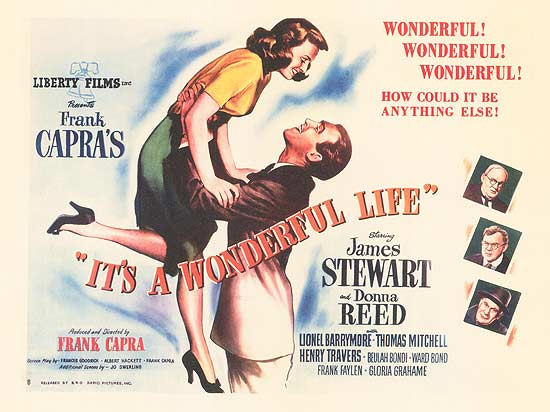There aren’t many American films as enduring or beloved as Frank Capra’s 1946 holiday classic, It’s A Wonderful Life. While there are many reasons for its timelessness, it’s important to consider its immense historical context.
Frank Capra was born in Palermo, Sicily. His family immigrated to America when he was 5, and the memory of his family being confined to the steerage section of the boat (the cheapest section) for 13 days stuck with him throughout his life. He remembered his father saying upon seeing the Statue of Liberty, “Ciccio, look! Look at that! That’s the greatest light since the star of Bethlehem! That’s the light of freedom! Remember that. Freedom.”
His father’s optimistic view of America influenced a great deal of Capra’s work, and none more so than It’s A Wonderful Life. Yes, the film is about the American dream, but it’s also about how life always finds a way to wedge itself between us and our aspirations. It observes that everyone starts out wanting to be an explorer or a bestselling author, but most end up living quiet lives and raising their own families. It’s A Wonderful Life does not condemn either lifestyle, instead using its protagonist George Bailey as a representation of the American reality.
In 1946, that reality was one shaped by a forever-changed world. It’s A Wonderful Life is a film that captured the spirit of the time – that of the classic redemption story. It’s a film designed to bring people together, and it challenges us to feel the urge to help those around us in lieu of the never-ending search for societal acceptance and pecuniary adequacy. It also happens to be a fantastic movie.
Anchoring the story is the incredible Jimmy Stewart, whose performance as George Bailey ranks as one of the most relatable and humane movie heroes to ever grace the silver screen. George Bailey is sarcastic, ambitious and unselfish. But most importantly, he’s not a saint. Stewart has to walk a very fine line with his performance, but never puts a foot wrong. He creates a character so fundamentally decent and good-natured that it’s all the more horrifying when his life starts to go wrong in every conceivable way. Additionally, Lionel Barrymore and Donna Reed shine in their supporting roles as the villainous Mr. Potter and George’s wife Mary respectively.
I could go on and on about why I love It’s A Wonderful Life. It’s beautifully written, the humor still holds up after 70 years and it’s an immensely satisfying redemption story that doesn’t feel the least bit
hackneyed. However, I believe its best trait is its fearlessness.
Allow me to explain: At the end of the second act, George Bailey is facing his arrest for a mistake he didn’t make. In fact, his entire life has been derailed by one accident and random incident after another, which has forced him to stay in his hometown of Bedford Falls, New York, even though he vowed as a child to see the world. He plans to kill himself that night, on Christmas Eve. The movie doesn’t shy away from this fact, and allows the story to get appropriately dark. George loves his kids and his wife, but he’s angry at a world that seems like it’s trying to sabotage him at all costs. Eventually, his guardian angel Clarence shows him what an alternate version of Bedford Falls would look like if he had never been born, which finally snaps him out of it. The movie lulls you into thinking that the story might end on an incredible downer, which only makes the eventual resolution all the more powerful.
Speaking of that final scene, to my mind it’s one of the best endings of any film ever released. It never ceases to make me cry, and when I watched this two weeks ago at my local theater it still reduced the audience to tears. During the whole film George Bailey has prided himself on being a self-starter, and not needing people to solve his problems for him. He’s built up a reputation in Bedford Falls as a good, honest man that people can count on. So when Mary raises money around town to help pay back the bank examiner, she allows him to see the truth that many already know: it’s not a sign of weakness to rely on people. His moment of relief as he’s clutching his wife and kids after knowing how close he was to losing it all is incredibly moving.
The entire room belts out “Auld Lang Syne,” a song derived from a Scottish poem by Robert Burns. Although this song is traditionally played to usher in the new year, it takes on a special thematic resonance in this scene. Throughout the film, George is more than a little dismissive of some people he grew up with in Bedford Falls when he meets them later in life. He feels that in order to truly leave his hometown, he has to sever the personal connections that threaten to keep him here in the first place. His relationship with an old friend Sam Wainwright is a prime example.
It’s clear that George is somewhat annoyed by him, but he tolerates him because he knows Sam is kind at heart. At the film’s climax, Sam (now rich off of an investment deal that George turned down) sends some money and helps George out at his most desperate hour. As the song asks, “Should old acquaintance be forgot, and never brought to mind?”
George would seem to think so, if that acquaintance threatened to keep him from his dreams. When Sam sends him the money, George almost has a guilty expression on his face, as the relationship was clearly more one-sided than he had anticipated. It’s a subtly humane plea to stay connected with those who care about us. As the film reminds us, no man is a failure if he has friends.
Even if you disagree with my subjective opinion of the movie, its objective historical importance elevates it even further in my eyes. It’s A Wonderful Life is a film about our inherent capacity for goodness as human beings, and its release in the wake of some of the most despicable acts in human history is no coincidence. George Bailey is the quintessential everyman that America needed at the time, or rather didn’t know that it needed. After all, the film was a commercial failure and it only achieved long-term relevance by being played incessantly on TV during the 70s, as it was free to air. Nobody cared enough to renew the copyright. The film in itself is a redemption story.
While there are some movies that simply do not make sense without the inclusion of the holiday (Home Alone, A Christmas Story, Elf), It’s A Wonderful Life, while taking place around Christmas, could technically work without the holiday. While some may interpret this as a knock against its Christmas movie status, its message is so thoroughly wrapped up in the spirit of kindness and generosity (two must-haves in every Christmas movie) that I feel that its more than deserving of this moniker.
Yes, It’s A Wonderful Life can be enjoyed at any time of the year, but it undoubtedly takes on a special resonance at Christmastime. And since I believe it to be a better put together and emotionally satisfying film than any other Christmas movie (including the ones listed above, all of which I love by the way), it takes the top spot for me.
In short, It’s A Wonderful Life is the best Christmas movie because it is the best movie that happens to take place on Christmas. However, it operates in similar thematic territory to other Christmas movies. It’s a modern biblical parable about loving thy neighbor, and it captures the Christmas spirit better than any other Christmas movie without ever mentioning Santa Claus and his reindeer. It celebrates and condemns the ups and downs of life, and advocates for the presence of both. Furthermore, it’s a film that’s emblematic of the American dream, and how sometimes that isn’t nearly as important as finding people that you share a mutual bond with.
It speaks to our capacity as human beings (and at the time, as a nation) to endure hardships and rely on others to pull us through the filth. And lastly, it impresses upon us that each and every person is valuable, and the greatest gift of all is the gift of life. On a holiday that was created to celebrate a birth, it doesn’t get much more festive than that. All hail It’s A Wonderful Life, the definitive Christmas movie, and one of the best movies ever made.






Leave a Reply